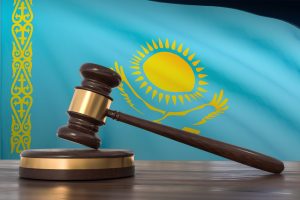This week, a court in the Kazakh capital Astana decided to move the two trials of two different political figures, in two entirely separate cases, behind closed doors, citing concerns about the safety of witnesses. Given the political activities of both defendants – each the leader of an unregistered political party – the shifting of their trials behind closed door raises questions about transparency and the rule of law.
On October 30, the trial of Marat Zhylanbaev, the leader of the unregistered “Alga, Kazakhstan!” party, began in Astana with a preliminary hearing at which the judge ruled in favor of a petition from two witnesses to move the trial behind closed doors. The judge said that the two witnesses had indicated that “they and their close relatives received threats from unknown persons and were under pressure.” The identities of the witnesses were not revealed.
Zhylanbaev, 60, faces charges of “involvement in a banned organization” and “financing the activities of an extremist organization,” allegedly for contact with the Mukhtar Ablyazov, founder of the Democratic Choice of Kazakhstan party, which Astana branded an extremist organization in 2018.
Zhylanbaev was excluded from the February 2023 parliamentary election (the authorities excluded him for “early campaigning” reportedly due to a social media post calling for funds to pay the registration fee to become a candidate). He was then detained in early May and sentenced to a 20-day administrative term for holding a picket in March, in which he demanded the release of political prisoners and called on Western states to sanction Kazakh officials for aiding Russia in evading sanctions. Zhylanbaev was not released at the end of the 20 days and has remained in detention since, as an investigation proceeded and returned the criminal charges he now faces.
Over the summer in several Kazakh cities, supporters jogged in support of Zhylanbaev, a well-known marathon runner before his foray into politics.
Meirzhan Doskaraev, Zhylanbaev’s lawyer, argued in court this week that moving the trial behind closed doors violated the constitution, but the judge was unmoved by his argument.
Alga, Kazakhstan!, which means “Forward, Kazakhstan!” has sought registration as a political party since May 2022; as of July 2023 it had been rejected 16 times by the Ministry of Justice.
The following day, in apparently the same court – the specialized inter-district criminal court of Astana – a prosecutor’s request to move the trial of Nurzhan Altaev behind closed doors was granted. Again, the authorities cited concerns for the safety of witnesses, without providing many details.
Altaev is a former Mazhilis deputy, of the erstwhile Nur Otan party, and leader of the unregistered El Tiregi party. El Tiregi (which in Kazakh means “Support of the Nation”) was formed as public association in 2019 aimed at influencing Nur Otan (renamed in 2022 to Amanat), but in 2020 Altaev broke with the ruling party and started out on his own.
In June 2023, Kazakhstan’s anti-corruption service said Altaev was a suspect in the case of Ablay Myrzakhmetov, the former head of the Atameken National Chamber of Entrepreneurs, a business lobby with close ties to Timur Kulibayev, the husband of one of former President Nursultan Nazarbayev’s daughters. Myrzakhmetov was detained in May on suspicion of soliciting a nearly $30 million bribe. The authorities allege that Altaev in 2018-2020 was “acting in the interests of Myrzakhmetov, [and] contributed to his organization… and provided general patronage.” At that time, Altaev was a deputy in the Mazhilis and vice minister of labor and social protection.
Altaev called the charges against him “nonsense,” mocking the very idea that “some unknown at that time, deputy minister of one of the most uninfluential ministries” was somehow being paid by “the powerful…Atameken, whose leadership includes the entire Forbes Kazakhstan list, oligarchs and billionaires of the country…”
He noted that it was a “strange coincidence” that the authorities alleged his crimes took place in 2018-2019, but that “the law enforcement agencies, apparently, sat and turned a blind eye to all this for five years, and then, when I began to engage in politics and opposition activities and criticize the actions of the authorities, suddenly they all wake up, arrest me, and initiate a criminal case under a serious crime.”
Although the content of the Zhylanbaev and Altaev cases are different, the fact that both men lead unregistered parties lends a political overtone to the trials. The movement of both cases behind closed doors also speaks to a lack of transparency in politically sensitive cases in Kazakhstan. Although the safety of witnesses is important, little information is known about the identity of the witnesses, the validity of the alleged threats against them, or what other measures the law enforcement system could enact to protect them while also preserving a degree of transparency in the proceedings.

































